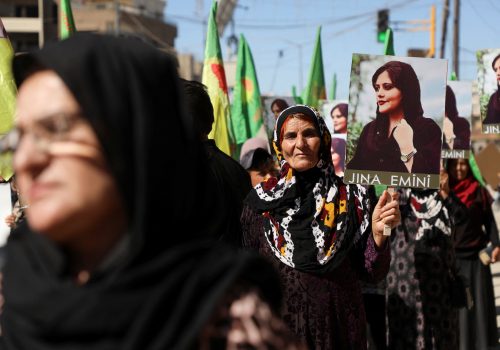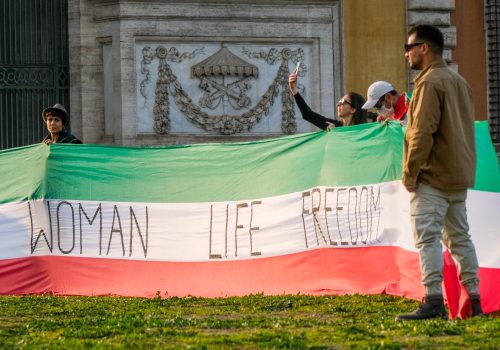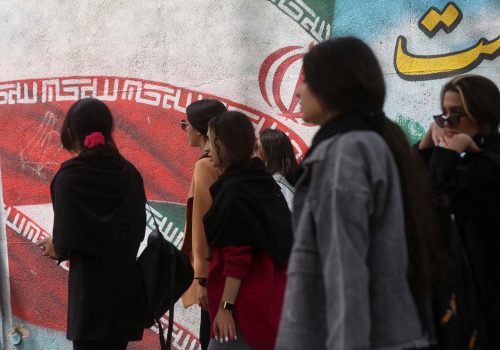Schoolgirl poisonings are persisting in Iran. So should the international reaction to them.
The reopening of schools in Iran after the Nowruz (New Year) holidays in April has been met with the continuation of targeted poison attacks on schoolgirls. It has been five months since the first case of poisoning was reported in girls’ schools. Since then, over thirteen thousand female students in twenty-eight of Iran’s provinces have been hospitalized due to these attacks. Despite the gravity of this situation, the Islamic Republic has not taken adequate measures to investigate or forestall their recurrence. Additionally, while several established international institutions possess the jurisdiction to undertake independent inquiries into these incidents, their response has not been commensurate with the severity of the attacks.
Since the first poisoning incident in November 2022, thousands of female students in different regions of the country have reported experiencing severe symptoms, including shortness of breath, dizziness, numbness in limbs, and nausea, after inhaling scents often described as citrus and chloride. In the first few weeks, reports of schoolgirl poisonings were limited to the holy city of Qom. However, the frequency and geographic spread of the incidents quickly escalated, such that many parents across the country refused to send their daughters to school. In the meantime, the Islamic Republic’s response followed a pattern similar to past crises: denial, cover-ups, silencing of protesting students and families, and detention of at least one journalist covering the issue. The Islamic Republic’s inadequate and irresponsible response to the safety of schoolgirls quickly fueled public outrage, prompting parents and teachers in at least twenty cities to gather in front of the Education Ministry buildings, demanding accountability for the perpetrators.
After weeks of denial, the deputy health minister acknowledged in an interview that the attacks on girls’ schools were intentional, and blamed extremist groups who seek to dissuade girls from pursuing education by increasing its cost (he later retracted these statements under pressure from conservative groups). Initially, the public did not find this claim credible, since the right to education for girls has never been a point of contention in Iran’s political and public sphere after the 1979 revolution, despite the numerous limitations imposed on women. However, as the range of attacks expanded and a few clerics and politicians hinted at the possible involvement of extremist groups, this theory has gained greater traction.
From the outset, many individuals and analysts directed blame toward the government. Since the beginning of the Women, Life, Freedom movement in September 2022, young women and girls—particularly those in high schools and universities—have been at the forefront of this movement. Consequently, girls’ schools were repeatedly targeted and attacked by security forces. Some analysts believe that serial attacks against girls’ schools are a means of punishment and revenge by the government against female students. They argue that the government seeks to control and silence one of the main sites of protests by creating fear among female students. This theory suggests that the government, which has failed to indoctrinate the young generation—Generation Z—through ideological education, may also be allowing its extremist supporters to act against schoolgirls. As Nadia Aghtaie, a senior lecturer on Gender and Violence at the University of Bristol, states, “Currently, education in Iran is a mobilizing force for women, and the government’s attempt to Islamize society through education has failed. This is why insiders want to reverse the government’s education policies and force girl students to stay at home.”
Meanwhile, some analysts have suggested that the series of poisonings among female students in Iran may be attributed to mass hysteria—a phenomenon in which a large group of people experience the same symptoms due to stress and anxiety without any specific medical or external causes. This argument, which is primarily based on the absence of evidence proving the poisoning, was quickly welcomed by conservatives and Iranian officials. Even the state media used this argument to downplay the severity of these attacks and deflect responsibility from the government.
However, the theory of mass hysteria to justify the poisonings was met with strong opposition, noting that authorities have restricted access to any possible evidence. Several families of affected students reported that Islamic Revolutionary Guard Corps (IRGC) forces have been preventing investigations and dissemination of information by monitoring hospitals, threatening doctors and nurses, and, in some cases, collecting students’ blood tests. Additionally, journalists have been instructed not to report on news related to the poisonings after the Nowruz holidays.
With the idea of mass hysteria being rejected by the public, the government was compelled to acknowledge that the attacks were intentional. It was four months into the incidents when, on March 6, 2023, Supreme Leader Ayatollah Ali Khamenei openly denounced the targeted attacks on girls’ schools. Shortly after the speech, the Interior Ministry issued a statement announcing the arrest of several individuals in different provinces in relation to the poisonings. However, the ministry’s contradictory and controversial statements have raised suspicions regarding the sincerity of their pledge to apprehend the perpetrators. The Interior Ministry’s statement claimed that the actions made by some of those arrested were non-hostile and that they were released after “receiving guidance.”
Most recently, the Intelligence Ministry released a statement on April 28 reiterating these claims and attributing the incidents to the use of stink bombs and pepper spray by mischievous individuals, as well as mass hysteria. Despite these claims, the escalation of attacks has been so severe that medical facilities in some small cities could not accommodate all affected students. Still, there seems to be no actual plan by the government to address the attacks, which further underscores the notion that such statements and rhetoric are mere lip service.
Due to a lack of an independent investigation, many questions about these attacks remain unanswered. What is evident, though, is that these attacks are targeted and systematic, constituting a blatant violation of human rights and an act of violence against women. While the United Nations (UN) has raised concern regarding these incidents and the government’s inadequate response, the international community must take stronger action against these events to compel the Islamic Republic to permit an independent investigation into these assaults on schoolgirls.
As the primary organization responsible for promoting children’s rights under the UN Convention on the Rights of the Child (UNCRC), UNICEF must immediately start a prompt investigation into these incidents. Furthermore, the World Health Organization (WHO) and Organization for the Prohibition of Chemical Weapons (OPCW) must utilize their technical expertise to discover the nature of these poisonings and deliver their findings to the UN Human Rights Council. Additionally, given that several analyses suggest a potential link between these attacks and the recent protests in Iran, it is within the mandate of the fact-finding mission on Iran, recently established by the UN Human Rights Council, to investigate these poisonings in the context of the government’s response to these protests. Their findings can be the basis for the decision-making process of international courts and the UN Human Rights Council.
Through these channels, the international community must take decisive and expeditious measures to ensure accountability and safeguard the human rights of Iranian citizens, especially women and girls. Further passivity by international organizations conveys the message that hardliners and extremists in Iran will not face any consequences on the international stage, regardless of how heinous their actions might be.
Mahnaz Vahdati is a Young Global Professional with the Atlantic Council’s Middle East Programs.
Further reading
Mon, Sep 26, 2022
‘Women, life, liberty’: Iran’s future is female
IranSource By
Women, young and old, have been at the forefront of the uprising, just like every other protest in Iran over the past decades.
Thu, Feb 23, 2023
Iran’s ‘women, life, freedom’ revolution has a manifesto. Here are the next steps.
IranSource By
Signed by twenty organizations and released on February 13, the manifesto gathered the support of many civil society organizations in Iran.
Thu, Apr 20, 2023
The Islamic Republic is mobilizing all its forces against unveiled Iranian women, but they’re pushing back
IranSource By
Despite all these brutal actions by the clerical establishment, many Iranian women are taking a prominent role at the forefront of the non-violent opposition to the gender apartheid system in Iran by defying the mandatory hijab.
Image: Smoke swirls around three women in gas masks protesting the poisoning of schoolgirls in Iran. The presentation was part of a demonstration against the Islamic regime of Iran, during a day of women’s marches around the world. National Solidarity Group of Iran hosted the event, which featured prominent Iranian-American women in a protest joined by members of US-Ukrainian Activists. Protesters continue to demand an end to the poisoning of schoolgirls, curtailment of nuclear negotiations, and the fall of the Islamic regime. (Photo by Allison Bailey/NurPhoto)


